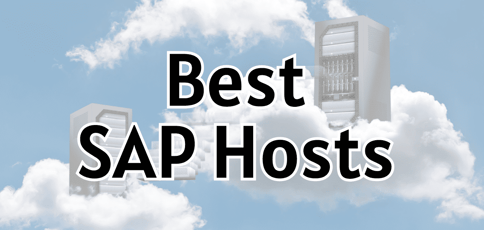
Not so long ago, I wrote about the cloud service market share. From the trends we’ve seen over the last couple of years, it’s safe to say that cloud hosting is the future of web hosting. Small and large businesses are rapidly shifting their operations to the cloud.
SAP applications and products are at the core of the great migration. Migrating to the cloud comes with many benefits, including increased efficiency, cost-effectiveness, security, stability, and reliability. That said, while moving to the cloud is the newest thing in town, how and where you move matters a lot.
That’s what we’ll discuss today: the best SAP hosting services. This ensures that your cloud migration is worth the change.
1. Amazon Web Services via Cloudways
The thought of migrating to Amazon Web Services was once inconceivable for businesses with smaller budgets. That’s because Amazon has invested billions of dollars into its cloud hosting infrastructure, influencing its pricing. On top of that, it’s one of the biggest hosting providers by market share.
Enter Cloudways, the bridge between AWS and businesses or enterprises with smaller budgets. With Cloudways, you can get the best of AWS SAP cloud hosting services without spending the big bucks like some of its popular clients, including Netflix, Adobe, BBC, Twitter, Twitch, and Airbnb.
Cloudways.com
- Managed cloud hosting with 24/7/365 monitoring
- Choose from 5 popular cloud providers
- Auto-healing cloud servers with FREE backups
- 3-day free trial with no credit card required
- Host unlimited apps with no contract lock-in
- Get started on Cloudways now.
CLOUD
RATING
★★★★★
Our Review
If you can’t beat the cloud provider behemoths, offer their infrastructure as a service. Cloudways gives customers their choice of cloud platform: AWS, Google, Linode, Digital Ocean, or Vultr. Go to full review »
| Setup Time | Disk Space | CPU | RAM |
|---|---|---|---|
| 8 minutes | 20 GB SSD – 4 TB SSD | 1 – 96 cores | 1 GB – 384 GB |
AWS doesn’t disappoint when it comes to SAP hosting. It offers everything you’d expect from a cloud service behemoth. I like that it offers support for various SAP HANA cloud scenarios, including native HANA applications, S/4HANA, BW/4HANA, SAP Business One Cloud, Business Suite on HANA, and HANA Business Warehouse, among others.
Even better, Amazon supports up to 48 terabytes of memory for SAP S4HANA cloud products. That should give you an idea of this company’s powerful infrastructure. But don’t let the power scare you, especially financially. You only pay for the infrastructure you need and use.
2. Google Cloud Platform via Cloudways
At Cloudways, you also have the option to choose Google Cloud Platform as your preferred cloud host for SAP solutions. Interestingly, GCP comes third on the list of the biggest cloud hosting providers by market share, and it’s not difficult to see why.
This giant tech company offers more than SAP hosting. I like that it also offers some powerful resources and managed services you can use to get the most out of your cloud environment and, of course, your SAP application.
I’m talking about virtual private cloud networking to connect your virtual machines, Google’s powerful Compute Engine, Google Cloud Console, and Google Cloud Storage to back up your SAP database. Note that these are just some instances of what GCP brings to the table, not a complete list.
Cloudways.com
- Managed cloud hosting with 24/7/365 monitoring
- Choose from 5 popular cloud providers
- Auto-healing cloud servers with FREE backups
- 3-day free trial with no credit card required
- Host unlimited apps with no contract lock-in
- Get started on Cloudways now.
CLOUD
RATING
★★★★★
Our Review
If you can’t beat the cloud provider behemoths, offer their infrastructure as a service. Cloudways gives customers their choice of cloud platform: AWS, Google, Linode, Digital Ocean, or Vultr. Go to full review »
| Setup Time | Disk Space | CPU | RAM |
|---|---|---|---|
| 8 minutes | 20 GB SSD – 4 TB SSD | 1 – 96 cores | 1 GB – 384 GB |
Having your SAP applications and products hosted by Google means you’re looking at powerful infrastructure, highly redundant systems, and top-notch SAP security, among other features. To give you some perspective on the quality of hosting infrastructure at Google, this company recently announced its plan to invest more than $30 billion in its cloud hosting infrastructure.
One thing I know for sure is that Google Cloud’s pricing can be quite confusing, even though the company has a pricing calculator you can use to estimate the costs. That shouldn’t be a problem anymore with Cloudways in the picture. This host breaks down the pricing into smaller, affordable plans, allowing businesses with different budgets to get the most out of GCP’s services.
3. OVHcloud
You probably already know this, but by the end of 2027, all instances of SAP ERP must migrate to SAP S/4HANA. There’s no better time to do it than now to avoid the last-minute rush. OVHcloud makes this migration much easier.
But it’s not just about the migration service; this SAP platform has a powerful SAP hosting infrastructure designed to help your business thrive. Whether you’re looking for a bare metal dedicated server or private cloud environments, you’ll find them at OVHcloud.
OVHcloud
- Bare Metal & VPS dedicated servers for all needs
- Complete solutions for managing who gets into your systems, ensuring secure connections with SSL certificates, and protecting against DDoS
- Pay for what you use with an easy-to-understand billing system
- Get started on OVHcloud now »
SAP
RATING
One characteristic that stands out to me about OVHcloud is the transparent pricing system. You won’t have to worry about not knowing what to expect in your next billing cycle. As with most cloud hosting providers, you only pay for what you use.
Finally, you can forget about the complexities of navigating the cloud system. This company has a team of experts with SAP certifications who can help you migrate and acclimate to your new environment. From a developer’s perspective, that’s a huge plus.
4. Microsoft Azure
Microsoft Azure is moving fast and steady in the race to dominate the cloud hosting market. The newest data from Statista placed Azure right behind AWS, with a 7% difference in the last quarter of 2023.
Azure’s support for SAP products and solutions is one reason this platform has taken a huge leap in the cloud hosting industry, almost rubbing shoulders with AWS. It supports all SAP instances and offers on-demand virtual machines that are highly scalable and reliable.
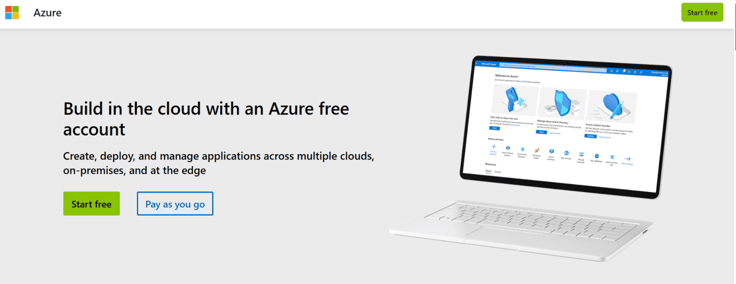
To put money where its mouth is, Azure offers a 99.99% service-level agreement for large SAP instances. This degree of confidence all boils down to its state-of-the-art infrastructure worth billions of dollars.
With Azure, spending more money than intended is the last thing you need to worry about. Its cost estimator tool lets you add specific features to your cloud environment, including storage accounts, virtual machines, SQL databases, and AI services. I also like that it provides an estimate for better planning and budgeting.
5. Alibaba Cloud
Alibaba Cloud ended the last quarter of 2023 holding the fourth largest share of the cloud service market, just behind Google Cloud, Azure, and AWS. This host offers affordability, availability, and compatibility with various SAP-specific applications. I’ll break down some of my favorite features for you below.
With its pay-as-you-go pricing model, there are no upfront processing fees. You can also subscribe to your preferred resources at fixed, affordable rates. Either way, you’ll get the best of SAP hosting without overstretching your budget.
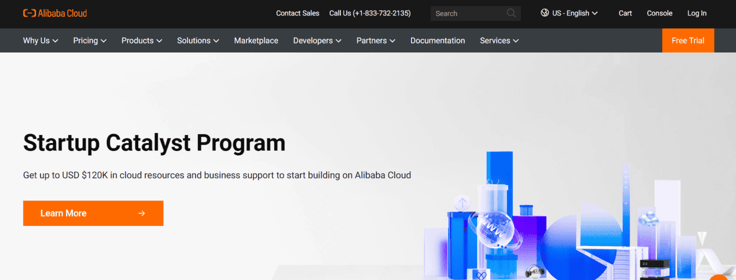
To fulfill its promise of high availability, Alibaba’s cloud architecture comprises various technologies, such as load balancing, web server clusters, and data storage layers to accommodate various storage needs, including massive unstructured data.
Alibaba Cloud also complies with some of the leading security standards in the cloud hosting industry. These include Criteria Catalog 5 (C5), CSA STAR, ISO 27001, and SOC2.
6. Rackspace
Rackspace supports a range of SAP technologies, including SAP Enterprise Resource Planning, SAP Commerce, SAP Business Technology Platform (SAP BTP), SAP Databases, and SAP S/4HANA. However, this cloud host differs from the others I’ve reviewed so far because it actively participates in decision-making.
Instead of letting you figure out everything yourself, Rackspace has a team of SAP consultants who can help you determine when and how to move your SAP workloads to the cloud. You’ll appreciate its SAP consulting services, particularly if you don’t have an in-house IT team to help with migration or critical decision-making.
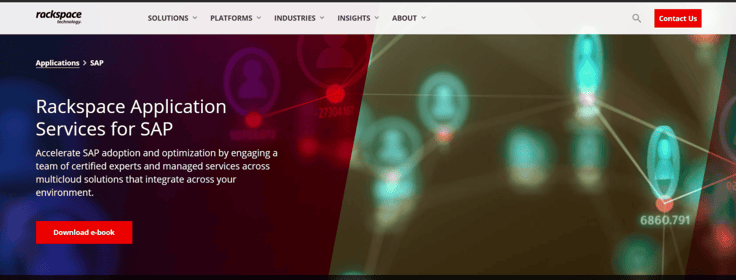
Overall, Rackspace is an industry leader in cloud hosting solutions. It boasts 20-plus years of experience, a team of more than 3,000 cloud experts, and customers in at least 150 countries.
For context, Panasonic Corp, Fujitsu Ltd, Providence, and Fred Meyer are some of the big brands that use Rackspace’s cloud SAP hosting service.
7. NetForChoice
For industries that require high availability, such as finance, healthcare, government, or eCommerce, NetForChoice is a great SAP hosting option. This host has tier 3 and 4 data centers known for their minimal downtime and high performance. Tier 4 data centers, in particular, work best for applications or businesses that cannot tolerate even the slightest amount of downtime.
Using an eCommerce website as an example, research has shown that even one second of downtime can lead to significant losses. If in doubt, let’s do some quick math. Amazon.com, one of the world’s leading websites, makes about $15,000 a second.
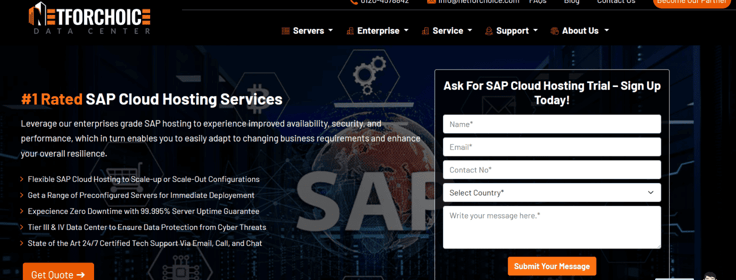
Your SAP vehicle, be it an online store or software, may not rake in the same level of income as Amazon, but uptime is still a key factor to consider when setting up an online business. The world of stock trading is another good example of an industry with zero tolerance for downtime. A one-second delay in stock trading can be the difference between massive profits or losses.
NetForChoice also offers various SAP cloud hosting solutions from the industry’s leaders. I’m talking about Amazon Web Services, Google Cloud Platform, Microsoft Azure, Alibaba Cloud, and IBM Cloud. That explains the high availability. Lastly, if you need help getting started, this host provides 24/7 certified tech support via email, call, and live chat.
What Is SAP Hosting?
SAP hosting is when a third-party provider runs and manages SAP applications and systems on behalf of a SAP customer (client). These providers, or rather the web hosting companies, maintain the infrastructure, platforms, and software necessary to ensure that the SAP system is always available, secure, and up-to-date.
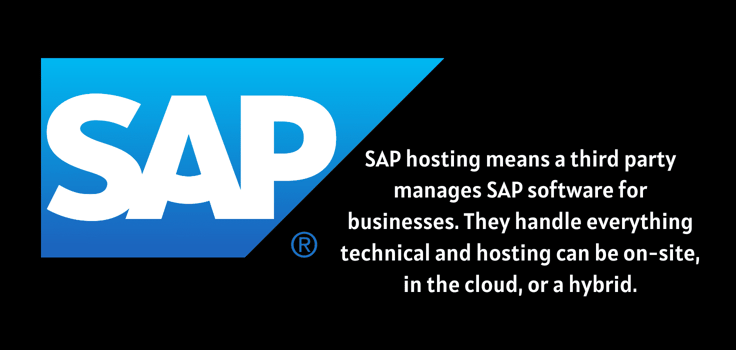
The main idea here is to allow businesses to focus on getting the most out of the SAP software without worrying about the underlying technical complexities or the need for in-house SAP expertise. This type of hosting can be on-premises, cloud-based, or a hybrid combination, depending on the business’s needs and the specific SAP solutions used.
What Is the Cost of a SAP Server?
You’ll need to consider different factors to determine the final cost of your SAP service. I’m talking about the type of deployment (on-premise vs. cloud), the size of the business, the number of users, the complexity of the applications, and the level of customization required, among other factors.
For on-premise solutions, where the SAP business hosts everything in-house, you’re looking at the cost of hardware, software licenses, maintenance, and maybe additional costs for SAP implementation services and ongoing support.
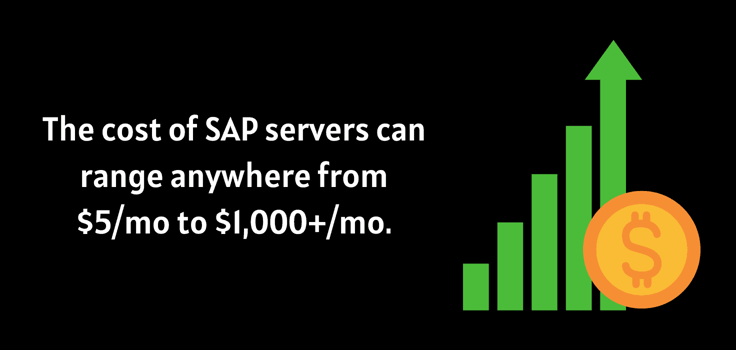
On the other hand, cloud-based SAP servers, like those I’ve covered in this guide, won’t charge you upfront. Nine times out of 10, they use a pay-as-you-go pricing model (sometimes with a price lock guarantee).
This means that you only pay for what you consume. In other words, the costs vary depending on the amount of hardware required (such as memory and data storage), the computing resources consumed, and so forth.
What Cloud Providers Are Best for SAP HANA?
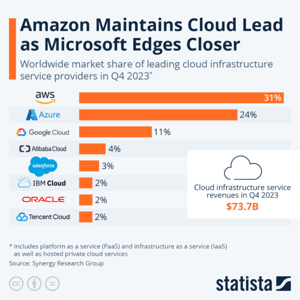
Amazon Web Services, Microsoft Azure, and Google Cloud Platform are the top three most popular cloud providers by market share.
(This shouldn’t shock anyone: Keep in mind that AWS was the first to offer cloud instances for SAP HANA.)
Microsoft Azure suits businesses that require integration with other Microsoft products.
Due to its powerful analytics, Google Cloud Platform is a great option for businesses looking to extract insights from their SAP data.
Just remember, each cloud provider has its own advantages. Your decision should match what you need, what you’re already using, and what you want to achieve.
Reap the Benefits of SAP Hosting
I’ve mentioned that cloud hosting is the future of web hosting. But when I think of it, this type of hosting is actually the present for many businesses that have already migrated to the cloud.
Businesses of all sizes are tapping into the power of cloud hosting to propel their fortunes to greater heights; so should you. Better still, adding SAP applications into the equation gives you access to various powerful business solutions under one colossal cloud.
HostingAdvice.com is a free online resource that offers valuable content and comparison services to users. To keep this resource 100% free, we receive compensation from many of the offers listed on the site. Along with key review factors, this compensation may impact how and where products appear across the site (including, for example, the order in which they appear). HostingAdvice.com does not include the entire universe of available offers. Editorial opinions expressed on the site are strictly our own and are not provided, endorsed, or approved by advertisers.
Our site is committed to publishing independent, accurate content guided by strict editorial guidelines. Before articles and reviews are published on our site, they undergo a thorough review process performed by a team of independent editors and subject-matter experts to ensure the content’s accuracy, timeliness, and impartiality. Our editorial team is separate and independent of our site’s advertisers, and the opinions they express on our site are their own. To read more about our team members and their editorial backgrounds, please visit our site’s About page.









